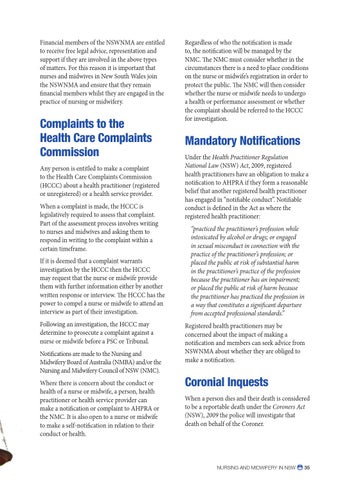Financial members of the NSWNMA are entitled to receive free legal advice, representation and support if they are involved in the above types of matters. For this reason it is important that nurses and midwives in New South Wales join the NSWNMA and ensure that they remain financial members whilst they are engaged in the practice of nursing or midwifery.
Complaints to the Health Care Complaints Commission Any person is entitled to make a complaint to the Health Care Complaints Commission (HCCC) about a health practitioner (registered or unregistered) or a health service provider. When a complaint is made, the HCCC is legislatively required to assess that complaint. Part of the assessment process involves writing to nurses and midwives and asking them to respond in writing to the complaint within a certain timeframe. If it is deemed that a complaint warrants investigation by the HCCC then the HCCC may request that the nurse or midwife provide them with further information either by another written response or interview. The HCCC has the power to compel a nurse or midwife to attend an interview as part of their investigation. Following an investigation, the HCCC may determine to prosecute a complaint against a nurse or midwife before a PSC or Tribunal. Notifications are made to the Nursing and Midwifery Board of Australia (NMBA) and/or the Nursing and Midwifery Council of NSW (NMC). Where there is concern about the conduct or health of a nurse or midwife, a person, health practitioner or health service provider can make a notification or complaint to AHPRA or the NMC. It is also open to a nurse or midwife to make a self-notification in relation to their conduct or health.
Regardless of who the notification is made to, the notification will be managed by the NMC. The NMC must consider whether in the circumstances there is a need to place conditions on the nurse or midwife’s registration in order to protect the public. The NMC will then consider whether the nurse or midwife needs to undergo a health or performance assessment or whether the complaint should be referred to the HCCC for investigation.
Mandatory Notifications Under the Health Practitioner Regulation National Law (NSW) Act, 2009, registered health practitioners have an obligation to make a notification to AHPRA if they form a reasonable belief that another registered health practitioner has engaged in “notifiable conduct”. Notifiable conduct is defined in the Act as where the registered health practitioner: “practiced the practitioner’s profession while intoxicated by alcohol or drugs; or engaged in sexual misconduct in connection with the practice of the practitioner’s profession; or placed the public at risk of substantial harm in the practitioner’s practice of the profession because the practitioner has an impairment; or placed the public at risk of harm because the practitioner has practiced the profession in a way that constitutes a significant departure from accepted professional standards.” Registered health practitioners may be concerned about the impact of making a notification and members can seek advice from NSWNMA about whether they are obliged to make a notification.
Coronial Inquests When a person dies and their death is considered to be a reportable death under the Coroners Act (NSW), 2009 the police will investigate that death on behalf of the Coroner.
Nursing and Midwifery in NSW
35
